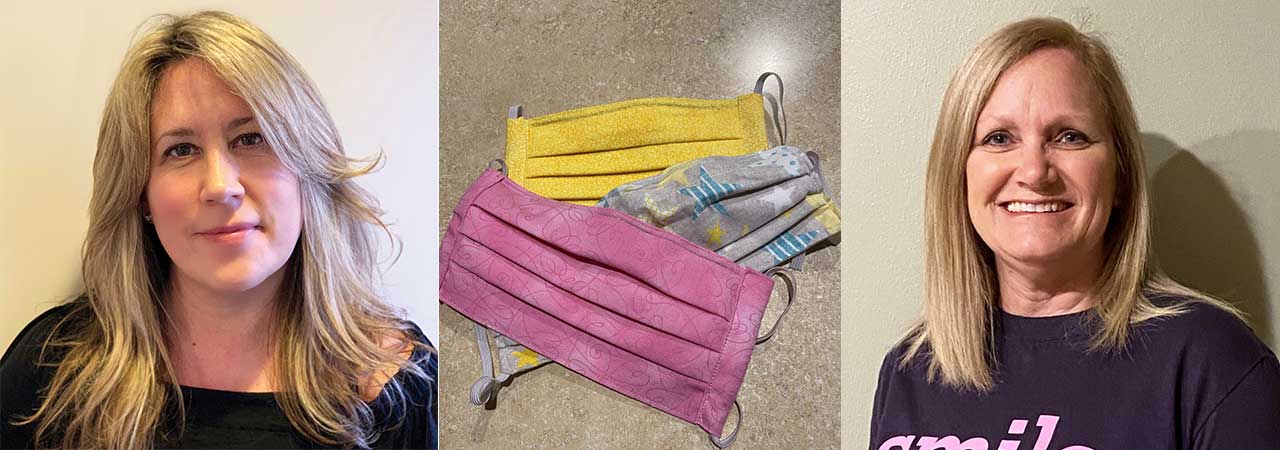DANB certificants donate supplies to fill PPE need

As COVID-19 began to spread across the nation early this spring, the availability of personal protective equipment (PPE) was stretched to meet the increased demand. What resulted was a supply shortage for many medical and dental professionals and other essential workers.
In response, dental professionals, including DANB certificants, stepped up to donate supplies when they were needed most. Here, we spotlight their heroic volunteer efforts.
Answering the call to donate
When Northwestern Michigan College (NMC) was contacted by Munson Healthcare in Michigan about donating PPE, health occupations instructor Rebecca L. Wooters, CDA, RDA, B.S., was happy to help fulfill the hospital’s request.
In mid-March, Wooters coordinated the donation of about 20 boxes of masks available through the dental assisting department, in an effort to help the hospital avoid a supply shortage. “We didn’t have the N95 masks, which they really wanted, but we gave them our regular operatory masks,” she shares. Additionally, the NMS nursing department stepped up to contribute a couple boxes of disposable gowns and at least 10 boxes of goggles.
“When we got the hospital’s call on March 18 and then asked our college administrators, ‘Do you mind if we donate?’ we were told, ‘Yes. Anything our community needs, we will donate, to support them; we would love to do that,’” Wooters recalls.
“Munson especially has always supported our health occupations program, letting nursing students come in to do their rotations and hiring our students,” Wooters continues. “They’re an integral part of our college’s culture. Our community is great at supporting each other when needed.”
Protecting grocery workers
After her orthodontic office temporarily closed its doors, assistant Sue Knierim, COA, began sewing masks for community members, including grocery store workers, in St. Louis, Missouri.
“I’ve followed the news, and the recommendations for dental and medical professionals and the public, really closely from the beginning — because not only do I work in dental, but my husband is a store manager for a small family-owned grocery chain,” Knierim reflects. “The potential for exposure there is scary. I told my husband, ‘You need to communicate with your employees about wearing face coverings.’”
Early on, grocery store employees wore bandanas, given the medical mask shortage. But Knierim recognized this was a less-than-ideal solution. “It’s hard to wear bandanas all day, because they don’t stay on.”
So, Knierim found another way to help keep workers safe. Following patterns from a hospital website and local nursing home, she sewed approximately 180 cloth masks with a pocket for a filter. Even with limited fabric available for curbside pickup from craft stores, Knierim bought all the brightly colored fabric she could find, and gathered fabric donations from neighbors and family members.
Knierim reports, “I spent my whole time off from work making masks and have donated them to where they’re going to be used,” including the grocery stores where wearing PPE now is a requirement, a senior living center and a restaurant.
Among those who are wearing Knierim’s masks are her grandchildren, whom she’s recently been able to spend more time with at home. In fact, now that Knierim’s office has reopened, she’s made the decision to transition to “full-time Grandma” after assisting for nearly 30 years.
“I love my job, and my heart is still in it, but right now, I don’t know about going back to the office,” admits Knierim, who says she is open to assisting on a limited basis. “A big consideration for me is that two of my grandkids would have been returning to a large daycare setting, and I just didn’t want that for them. So I’ve decided to do this and see how it goes, and I’ll reevaluate in the fall and see where everything is at with COVID-19.”

